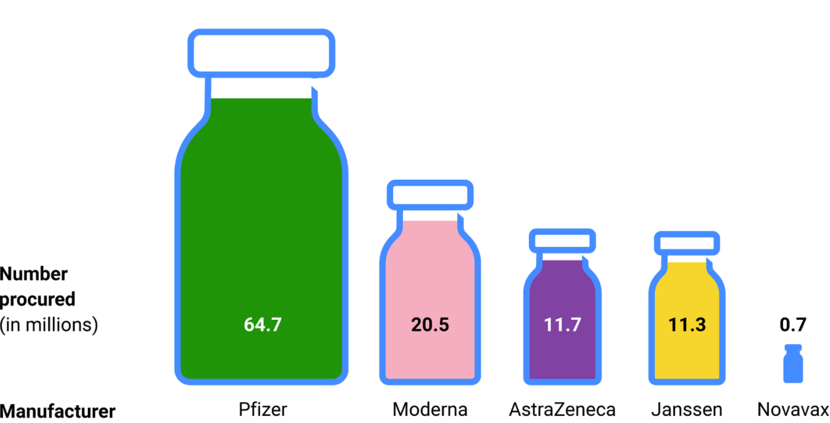Pathway out of the pandemic
Audit of COVID-19 vaccine procurement
The Netherlands procured 102 million COVID-19 vaccines at a cost of €1.8 billion in 2020 and 2021. This amount does not include expenditure via the European Union or the cost of vaccination itself. On the whole, the Ministry of Health responded well to the need to procure COVID-19 vaccines. The Netherlands played an active role in the vaccine negotiations, also at European level, and did not lose sight of public interests.
The Dutch government was ill-prepared to buy vaccines at the outbreak of the COVID-19 pandemic. It had to act in a hurry. What did it do? The Court of Audit has investigated the country’s response. The first reports arrive from China about a new infectious disease: COVID-19. COVID-19 reaches our country, the first fatality is reported a week later. The virus will ultimately take the lives of tens of thousands of people in the Netherlands. Restaurants, bars and schools close their doors. The first lockdown takes effect a week later. Health minister Hugo de Jonge presents an action plan to buy as many safe and effective vaccines as quickly possible. A vaccines team is set up and talks are held with potential manufacturers. The Netherlands joins forces with Germany, France and Italy to sidestep the European Union’s bureaucratic decision-making. Rich countries compete for vaccines. The Netherlands joins in, but also tries to help vulnerable countries. The four cooperating countries provide manufacturer AstraZeneca with funds to develop a vaccine. The European Commission takes over the negotiations but the Netherlands gains a place at the table. Talks are sometimes haphazard but there are no serious slipups. The Netherlands helps increase the EU budget so that contracts can be signed for several vaccines. It is not known which will be safe and effective. The Netherlands works hard to strike an agreement with Janssen. The minister prefers its vaccine because it is made in the Netherlands. Nevertheless, Pfizer becomes the main supplier: its vaccine works well and can be supplied quickly. It’s more expensive but that’s not so important. The crisis would cost a lot more without good vaccines. Vaccinations are available to everyone in the Netherlands. In total, the country buys 102 million vaccines at a cost of nearly 1.8 billion euros. Janssen and AstraZeneca run into supply problems. The European Commission signs another deal with Pfizer to supply vaccines in the future. More vaccines are contracted than are actually necessary. EU president Ursula von der Leyen conducted the negotiations herself, the negotiating team was barely involved. The Netherlands donates more than 200,000 AstraZeneca vaccines to Suriname: in total, 23 million injections are donated to 21 vulnerable countries. It’s a drop in the ocean globally, but at least it helps a little. Our audit found that the Netherlands was not prepared for a pandemic, but the Ministry of Health’s actions to buy vaccines were successful. Together with the European Union, the Netherlands bought enough effective and safe vaccines to lift it out of the crisis.
*Background music ends*
Dutch logo of the Court of Audit appears on screen.
The Netherlands procured 102 million vaccines, mainly from Pfizer, at a cost of €1.8 billion

In 2020 and 2021, the Netherlands procured some 109 million vaccines. As it did not need them all, it reduced the number to 102 million in 2023, at a cost of nearly €1.8 billion.
What did we audit?
The Court did not audit the efficiency of vaccine procurement. The total cost of the pandemic to the world and the Netherlands was so high that it overshadowed nearly every other capital expenditure. Economic losses due to the pandemic in the Netherlands alone are estimated at €65 billion. Neither did we investigate the safety of the vaccines. That was a task of the European Medicines Agency (EMA) and the Medicines Evaluation Board (CBG)|
The audit reconstructed the vaccine negotiations held in 2020 and 2021 to establish how the Netherlands procured vaccines. Key questions included whether the Dutch government used its best efforts to ensure effective and safely tested vaccines were procured in sufficient numbers to lift the country out of the pandemic. It also asked whether other public interests were kept in mind (such as effective accountability and price transparency). The answers are presented in the audit report.
Why did we audit vaccine procurement?
Vaccines were the main pathway out of the global pandemic but procurement negotiations were held chiefly behind closed doors. We thought it important to investigate whether the health minister had kept the most important public interests in mind during the negotiations and whether that was reflected in the final result.
What were our audit questions?
Our audit answered three key questions:
- How did the Netherlands procure COVID-19 vaccines and did procurement meet the standards we can expect?
- Are there indications that the Netherlands brought its influence to bear on the procurement of vaccines, which were ultimately procured under the European Commission’s leadership?
- Did the agreement of procurement contracts take sufficient account of the public interests that we can expect to be served?
Do you have any feedback about this audit?
We welcome all feedback on our audits. What do you think about the report? Do you have any questions or need more information? Mail us at feedback@rekenkamer.nl. We will read and consider all emails in confidence.